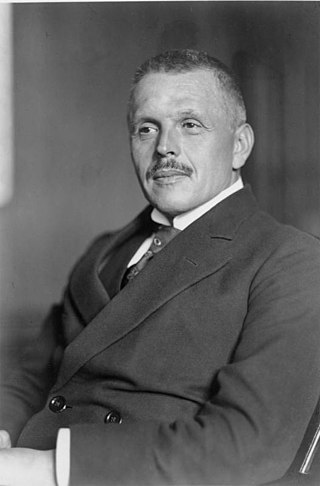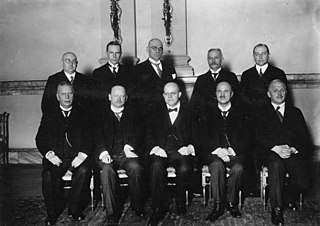
The Reichsmarine was the name of the German Navy during the Weimar Republic and first two years of Nazi Germany. It was the naval branch of the Reichswehr, existing from 1919 to 1935. In 1935, it became known as the Kriegsmarine, a branch of the Wehrmacht; a change implemented by Adolf Hitler. Many of the administrative and organizational tenets of the Reichsmarine were then carried over into the organization of the Kriegsmarine.

Carl von Ossietzky was a German journalist and pacifist. He was the recipient of the 1935 Nobel Peace Prize for his work in exposing the clandestine German rearmament.

Reichswehr was the official name of the German armed forces during the Weimar Republic and the first years of the Third Reich. After Germany was defeated in World War I, the Imperial German Army was dissolved in order to be reshaped into a peacetime army. From it a provisional Reichswehr was formed in March 1919. Under the terms of the Treaty of Versailles, the rebuilt German Army was subject to severe limitations in size, structure and armament. The official formation of the Reichswehr took place on 1 January 1921 after the limitations had been met. The German armed forces kept the name Reichswehr until Adolf Hitler's 1935 proclamation of the "restoration of military sovereignty", at which point it became part of the new Wehrmacht.

Hans Zenker was a German admiral.

Otto Karl Gessler was a liberal German politician during the Weimar Republic. From 1910 until 1914, he was mayor of Regensburg and from 1913 to 1919 mayor of Nuremberg. He served in numerous Weimar cabinets, most notably as Reichswehrminister from 1920 to 1928.

The Federal Ministry of Defence, abbreviated BMVg, is a top-level federal agency, headed by the Federal Minister of Defence as a member of the Cabinet of Germany. The ministry is headquartered at the Hardthöhe district in Bonn and has a second office in the Bendlerblock building in Berlin, which is occasionally used as a metonym to denote the entire Ministry.

The Bendlerblock is a building complex in the Tiergarten district of Berlin, Germany, located on Stauffenbergstraße. Erected in 1914 as headquarters of several Imperial German Navy offices, it served the Ministry of the Reichswehr after World War I. Significantly enlarged under Nazi rule, it was used by several departments of the Oberkommando der Wehrmacht (OKW) from 1938, especially the Oberkommando des Heeres and the Abwehr intelligence agency.
The Black Reichswehr was the unofficial name for the extra-legal paramilitary formation that was secretly a part of the German military (Reichswehr) during the early years of the Weimar Republic. It was formed in 1921 after the government banned the Freikorps that it had relied on until then to supplement the Reichswehr. General Hans von Seeckt thought that the Reichswehr no longer had enough men available to guard the country's borders, but the army could not be expanded because of the manpower restrictions imposed on it by the Treaty of Versailles.

German rearmament was a policy and practice of rearmament carried out by Germany from 1918 to 1939, in violation of the Treaty of Versailles which required German disarmament after WWI to prevent it from starting another war. It began on a small, secret, and informal basis shortly after the treaty was signed, but was openly and massively expanded after the Nazi Party came to power in 1933.

The Ministry of the Reichswehr was the defence ministry of the Weimar Republic and the early Third Reich. Based in the Bendlerblock building in Berlin, it was established in October 1919 under the leadership of a defence minister and staffed mostly from the existing Prussian Ministry of War. Its longest serving Weimar era ministers were the civilian Otto Gessler and the former general Wilhelm Groener.
Jules Greenbaum was a German pioneering film producer. He founded the production companies Deutsche Bioscope, Deutsche Vitascope and Greenbaum-Film and was a dominant figure in German cinema in the years before the First World War. He is also known for his early experiments with sound films around twenty years before the success of The Jazz Singer made them a more established feature of cinema.
Phoebus Film or Phoebus-Film was a German film production and distribution company active during the silent era. It was one of the medium-sized firms established during the early boom years of the Weimar Republic. It had a distribution agreement with the American studio MGM.

The Weltbühne trial was an important criminal proceeding during the Weimar Republic against the press and journalists who were critical of the military. The editor of the weekly Die Weltbühne, Carl von Ossietzky, and the journalist and aviation expert Walter Kreiser were charged with treason and betrayal of military secrets for revealing that the Reichswehr was secretly building up an air force in violation of the Treaty of Versailles. They were sentenced in November 1931 to 18 months imprisonment. The outcome of the trial raised a considerable outcry among the German political left and in the foreign press, which saw it as evidence that Germany was returning to its prewar militarism.
Hans Schimpf was a German Reichsmarine and intelligence officer. During the interwar period he helped co-found, on instruction from the Reichsluftfahrtministerium, the Signals intelligence organization called the Forschungsamt ; along with Hermann Göring and Gottfried Schapper. He was responsible for the organization between 1933 and 1935.
Berthold Jacob was a German journalist and pacifist during the Interwar period.

The fourth Marx cabinet, headed by Wilhelm Marx of the Centre Party, was the 15th democratically elected government during the Weimar Republic. On 29 January 1927 it replaced the third Marx cabinet, which had resigned after information concerning clandestine operations by Germany's armed forces, the Reichswehr, had come to light.

Ernst Schneller was a German school teacher. In 1914 he volunteered to join the army when war broke out. Sent to fight on the Eastern Front, he became politicised and radicalised, especially as the ideas behind the Russian Revolution filtered through to the German troops. After the war he joined first the Social Democratic Party and then, in 1920, the recently launched Communist Party of Germany. He served as a regional member ("Landtagsabgeordneter") of parliament in the Saxon parliament ("Landtag") between 1921 and 1924, and then between 1924 and 1933 as a member ("Reichstagsabgeordneter") of the national parliament ("Reichstag"). He was arrested in 1933 and imprisoned. Transfer to the Sachsenhausen concentration camp followed in 1939.

"Soldiers are murderers" is a quote from an opinion piece written in 1931 by Kurt Tucholsky and published under his pseudonym Ignaz Wrobel in the weekly German magazine Die Weltbühne. Starting with a lawsuit against the magazine's editor Carl von Ossietzky for "defamation of the Reichswehr" in 1932, Tucholsky's widely quoted assertion led to numerous judicial proceedings in Germany, also after World War II and until the late 20th century. In several cases in the 1990s, last in 1995, the Federal Constitutional Court ruled that using the quote as a means to express pacifist views is protected by the constitution of Germany.
Bruno Ernst Buchrucker was a German military officer known for leading the 1923 Küstrin Putsch.

Walter Lohmann was a German Reichsmarine officer with the rank of captain. From 1920 to 1927 as commander of the Naval Transportion Division, Lohmann ran a secret rearmament and research program on behalf of the Ministry of the Reichswehr in an attempt to circumvent the Versailles restrictions. Lohmann's access to naval offices in Königsberg, Lübeck, Stettin, Hamburg, and Bremen gave him access to very specialized information and financial resources. He used this knowledge in his work in a way that was far beyond his authority and technical competence. Favoured by the interests of the Chief of Naval Headquarters, Admiral Paul Behncke, it led to uncontrolled scope for legal violations, criminal activity and high-handed action by individuals within the ministry. When his work was discovered in 1927, the scandal became known as the Lohmann affair in Germany and led to the resignation of Reichswehr Minister Otto Gessler in January 1928 and director of naval command Admiral Hans Zenker. Lohmann himself was retired and his pension was cut, but he was never prosecuted, because to uncover the affair's true background would have been too great a risk. Completely impoverished, Lohmann died three years later of a heart attack. After he was relieved of duty, the clandestine rearmament programme was continued and expanded.












